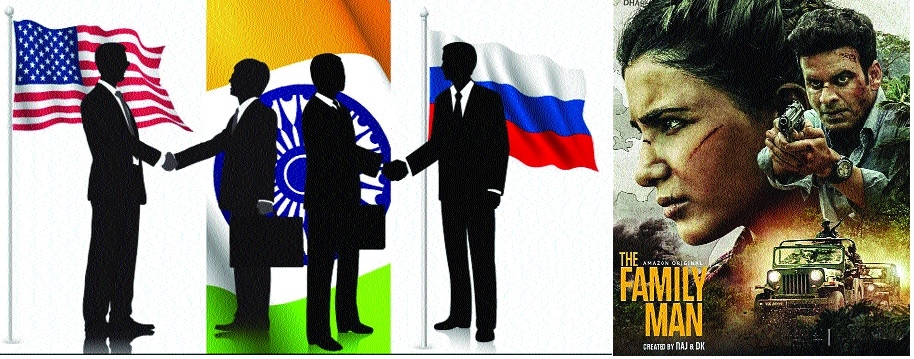Adding Art To Diplomacy
19 Jun 2021 08:48:59

Films, TV series like The Family Man can promote critical thinking on foreign policy.
By Rahul Dixit
As Season-2 of the spy thriller The Family Man basks in rave reviews across the world, it has silently opened a bold, much-needed and long-awaited gateway into a theme hardly touched by Indian cinema and series-makers. The web series has deftly dealt with some pivotal moments in India’s foreign policy in the recent years. It is a welcome detour and a courageous approach by the directors and writers of The Family Man to weave a gripping plot centered around a topic central to India’s foreign policy vis-à-vis China and Sri Lanka.
Indian film-makers have largely shied away from taking up subjects like international relations, diplomacy and foreign policy despite intense drama centred around them. In comparison to foreign films and daring television series, India has very few offerings that delve into the country’s nuanced diplomatic victories achieved over the years. It is a sad burden that the entertainment industry is willing to carry on due to lack of courage to handle these issues.

Given the massive reach they enjoy around the globe, films can prove to be a handy tool to underline India’s soft power. A country’s soft power, in Shashi Tharoor’s words, emerges from the world’s perception of what that country is all about. “The associations and attitudes conjured up in the global imagination by the mere mention of a country’s name is often a more accurate gauge of the soft power than a dispassionate analysis of its foreign policies,” Tharoor has written in his comprehensive book Pax Indica. Yet, the Indian entertainment industry inexplicably stays away from featuring diplomacy or India’s international relations in a story form.
Against this backdrop, The Family Man comes as a fresh breath for featuring a contemporary issue of Chinese interests in Sri Lankan port and India’s diplomatic maneuvers to woo back Colombo through transactional dealings. Artistic liberties aside, the writers/directors — Raj & DK and Suman Kumar — handled the issue with a fine dexterity, never making one side looking authoritarian in the conversations shown between the Prime Ministers of India and Sri Lanka. The obvious reference was to Beijing’s agreement with Colombo to handle the strategically important Hambantota port. The Indian response to the situation, offering to get hold of an Eelam rebel staying in Chennai and wanted by Lanka, is part of the give-and-take which forms the core of diplomatic moves on issues concerning national security.
The world of diplomacy works on a different-level of principles, untouched by what the common man perceives. Bargaining remains a critical component in diplomatic talks. Over the years, Indian diplomats have remained crafty practitioners of this art. A fine example of how diplomacy operates on a distinct plane is available in the strategic victory achieved in 1994 when Pakistan’s resolution condemning India for violation of human rights in Kashmir was defeated at the United Nations Human Rights Council (UNHRC). The coup was engineered by winning over votes of Iran and China, two biggest backers of Pakistan. Both votes were turned to the Indian fold with give-and-take measures. New Delhi offered to back China on a different resolution and also took a tactical decision to scuttle George Fernandes’ international seminar on Tibet. Ultimately, Pakistan had to withdraw the resolution.
Such examples, if handled by capable artists and writers, can form a compelling viewing. Considering the little understanding on how diplomacy shapes and manages foreign policy in practice it is important to bring diplomatic history on the silver screen. If the public becomes relatively more aware of foreign policy challenges, then political leaders can also approach courageous decision with ease.
India’s entertainment industry is yet to warm up to diplomacy and international politics as potent subjects for the reel. Parallely, international cinema has successfully moulded true accounts of diplomacy into crowd-pullers. From the Cuban missile crisis to the Oil-for-Food scandal that plagued the United Nations at the time of the 2003 invasion of Iraq, filmmakers have brought out the nuances and difficulties involved in diplomacy quite effectively. For instance, Backstabbing For Beginners, a political thriller of 2018, is a fine example of how cinema can bring out the ugly side of international philanthropy and how foreign policy makers view it through varied prisms. American drama Oslo (2021) brings to life the secret negotiations that finally resulted in 1993’s Oslo Peace Accords between Israel and Palestine Liberation Organisation (PLO). Eye In The Sky (2015) handles a government’s ethical dilemmas in military operations and political necessities shaped by international opinion. These subjects have assumed deeper penetration in everyday life for many countries whose military actions are always measured by the moral compass.
All these complexities of realpolitik can make for intense cinema. With artistic freedom at hand, some critical moments in Indian diplomacy can also be translated into a good form of edutainment. Potential themes that can attract crowd include Shimla Accord of 1972, the Kandahar plane-hijack drama, Nuclear deal with the United States in 2008 or even the brilliant negotiations to end the tense Doka La stand-off in 2017. These stories can produce celluloid glory and at the same time help in educating the masses on the nitty-gritty that goes into making of a policy.
While international cinema has successfully brought out the undercurrents in foreign policy, there seems a lurking danger among big production houses in India that a movie showcasing diplomacy may not stir up the same levels of adrenaline that a film dealing with terrorism can. Indian cinema has latched on to the espionage and terrorism themes with all its might. To be honest, the industry has traveled really well on the subjects as films like Madras Cafe, D-Day, Baby and web series like Special Ops and Family Man 1 and 2 have proved. These flicks have introduced alternate history as an engaging genre. There is now no hesitancy in calling out Islamic extremism or radical clergies influencing terror groups. A dash of jingoistic nationalism gives the terror-based films and series ready acceptance in India. However, if well handled, films on diplomacy can also promote a critical thinking on issues dealing with foreign policy. For, one of the most important social needs of India is a public fairly versed with beneath-the-surface issues that often go unnoticed when the Government makes moves in sheer national interest — beyond visible politics.
At present, there is a genuine lack of interest and awareness among the people on diplomacy. The situation merits a course correction. In fact, the Government can step in by incentivising projects involving foreign policy and diplomacy by making them tax-free. It can very well turn out to be a long-term investment and serve as accessible history for future generations. A bigger and informed audience through the medium of cinema can add more weight to a robust national narrative instead of a small group of elite determining India’s stand on global issues. n
